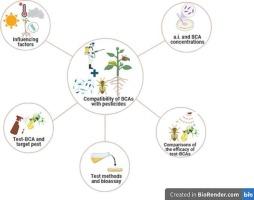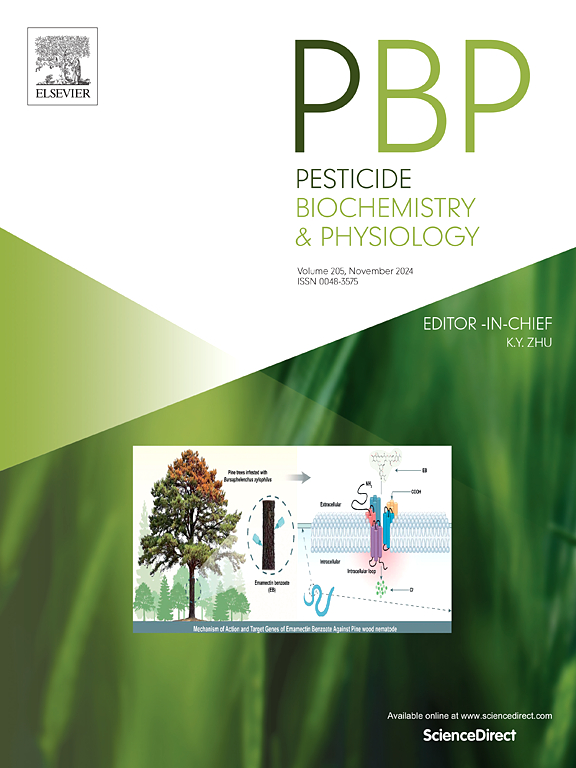Factors influencing pesticide-biocontrol agent compatibility: A metadata-based review
IF 4.2
1区 农林科学
Q2 BIOCHEMISTRY & MOLECULAR BIOLOGY
引用次数: 0
Abstract
The complexities of non-target effects of registered pesticides on biocontrol agents (BCAs) hinder the optimization of integrated pest management programs in agriculture. The wealth of literature on BCA-pesticide compatibility allows for the investigation of factors influencing BCA susceptibility and the generalized impacts of different pesticides. We conducted a meta-analysis using 2088 observations from 122 published articles to assess non-target effects on two phytoseiid species (Neoseiulus californicus and Phytoseiulus persimilis), a parasitoid (Encarsia formosa), and two microbial BCAs (Trichoderma harzianum and Metarhizium anisopliae). We explored the contributions of bioassay factors (exposure duration, temperature, test methods, mode of actions (MOA), and type of pesticide), and simulated effects of compatibility on target pests. MOA groups 21 and 6 were the most harmful to predatory mites and E. formosa, increasing mortality during pesticide-BCA compatibility. Exposure duration, temperature, and test methods were identified as the most influential factors increasing mortality in phytoseiids during pesticide exposure. Insecticides and fungicides were the most represented and harmful groups to BCAs. Although most bioassays were conducted at room temperature, temperatures between 21 and 22 °C were the most harmful to phytoseiids and E. formosa during toxicity assays. Exposure durations of 1–3 days (54–85 %) for predators/parasitoids and 1–5 days (>50 %) for microbial BCAs highlight the lack of data on long-term impacts. In assessing pesticide impacts on target pests, pesticides with compatible concentrations above mean LC50 values were more effective. This study not only identified compatibility trends but also highlighted factors responsible for discrepancies in results and knowledge gaps that need to be addressed.

影响农药-生物控制剂兼容性的因素:基于元数据的审查
已登记农药对生物控制剂(BCA)的非目标影响非常复杂,这阻碍了农业害虫综合治理计划的优化。有关 BCA 与农药兼容性的大量文献有助于研究影响 BCA 易感性的因素以及不同农药的普遍影响。我们利用 122 篇已发表文章中的 2088 项观察结果进行了一项荟萃分析,以评估对两种植物鞘翅目昆虫(加利福尼亚鞘翅目 Neoseiulus californicus 和持久性鞘翅目 Phytoseiulus persimilis)、一种寄生虫(Encarsia formosa)和两种微生物 BCA(毛霉菌 Trichoderma harzianum 和变形菌 Metarhizium anisopliae)的非目标影响。我们探讨了生物测定因素(暴露时间、温度、测试方法、作用模式(MOA)和农药类型)的贡献,并模拟了相容性对目标害虫的影响。MOA 第 21 组和第 6 组对捕食螨和甲形虫的危害最大,在农药-BCA 相容性过程中会增加死亡率。暴露时间、温度和测试方法被认为是在农药暴露期间增加植物螨类死亡率的最有影响的因素。杀虫剂和杀真菌剂是对 BCA 最有代表性和最有害的组别。虽然大多数生物测定都是在室温下进行的,但在毒性测定过程中,21 至 22 °C 的温度对植物鞘翅目昆虫和甲形虫危害最大。捕食者/寄生虫的接触时间为 1-3 天 (54-85 %),微生物 BCAs 的接触时间为 1-5 天 (50 %),这突出表明缺乏有关长期影响的数据。在评估农药对目标害虫的影响时,相容性浓度高于平均半致死浓度值的农药更有效。这项研究不仅确定了相容性趋势,还强调了造成结果差异的因素以及需要解决的知识差距。
本文章由计算机程序翻译,如有差异,请以英文原文为准。
求助全文
约1分钟内获得全文
求助全文
来源期刊
CiteScore
7.00
自引率
8.50%
发文量
238
审稿时长
4.2 months
期刊介绍:
Pesticide Biochemistry and Physiology publishes original scientific articles pertaining to the mode of action of plant protection agents such as insecticides, fungicides, herbicides, and similar compounds, including nonlethal pest control agents, biosynthesis of pheromones, hormones, and plant resistance agents. Manuscripts may include a biochemical, physiological, or molecular study for an understanding of comparative toxicology or selective toxicity of both target and nontarget organisms. Particular interest will be given to studies on the molecular biology of pest control, toxicology, and pesticide resistance.
Research Areas Emphasized Include the Biochemistry and Physiology of:
• Comparative toxicity
• Mode of action
• Pathophysiology
• Plant growth regulators
• Resistance
• Other effects of pesticides on both parasites and hosts.

 求助内容:
求助内容: 应助结果提醒方式:
应助结果提醒方式:


